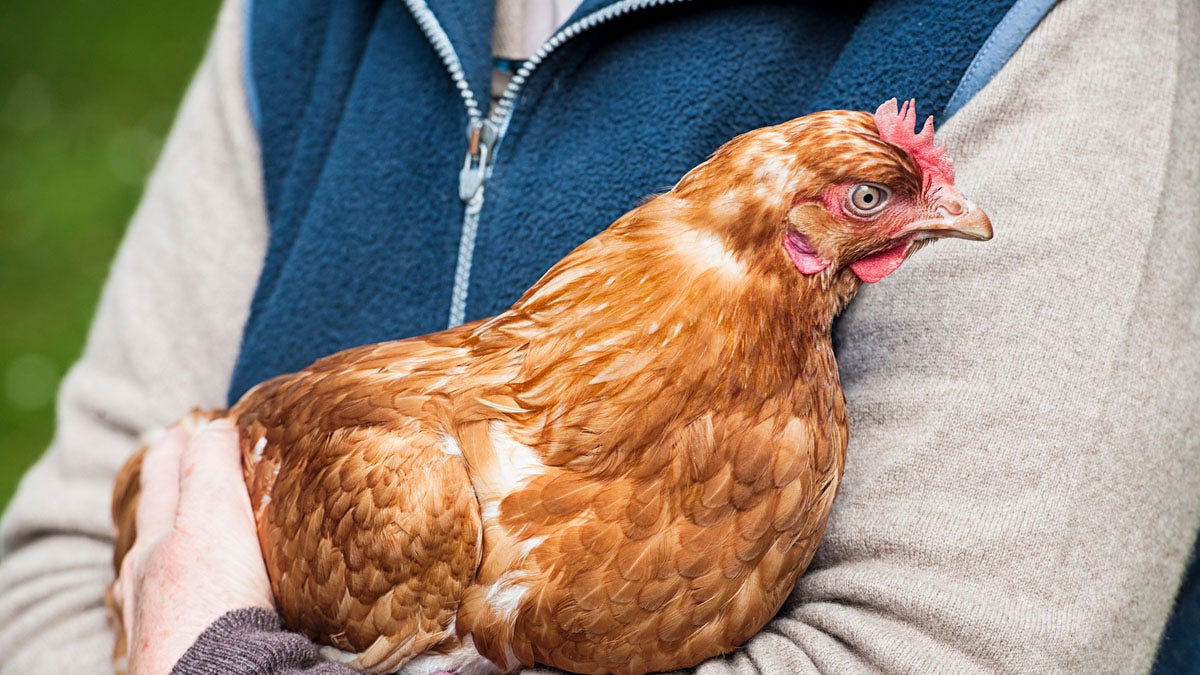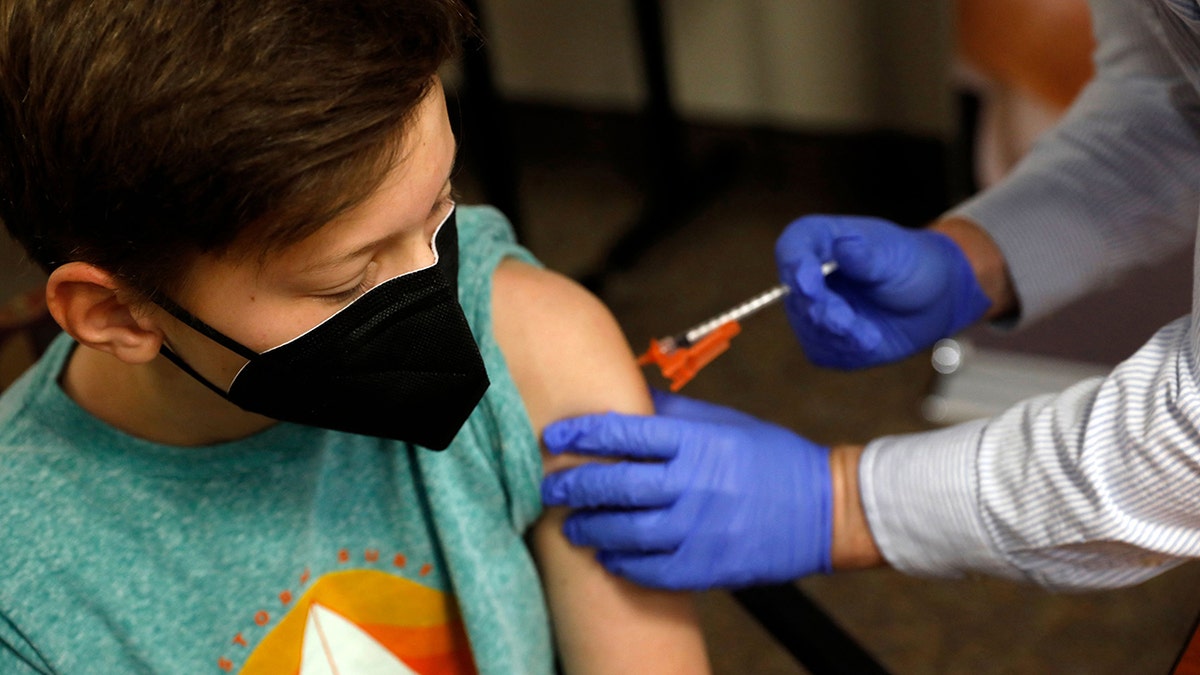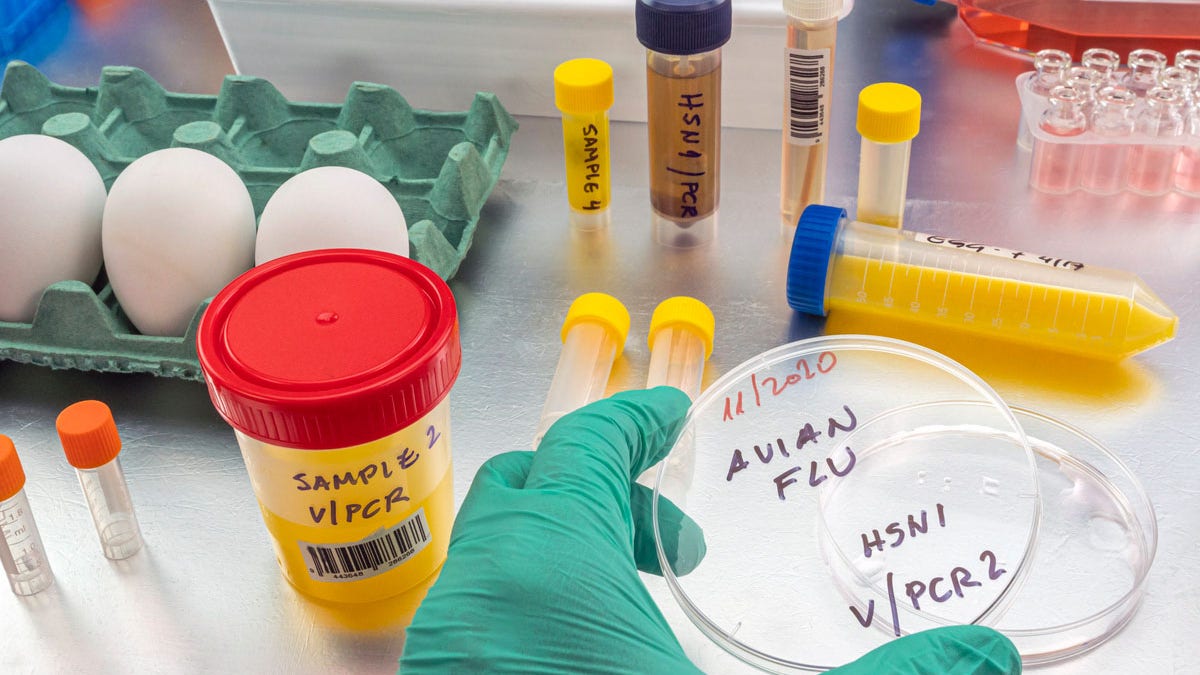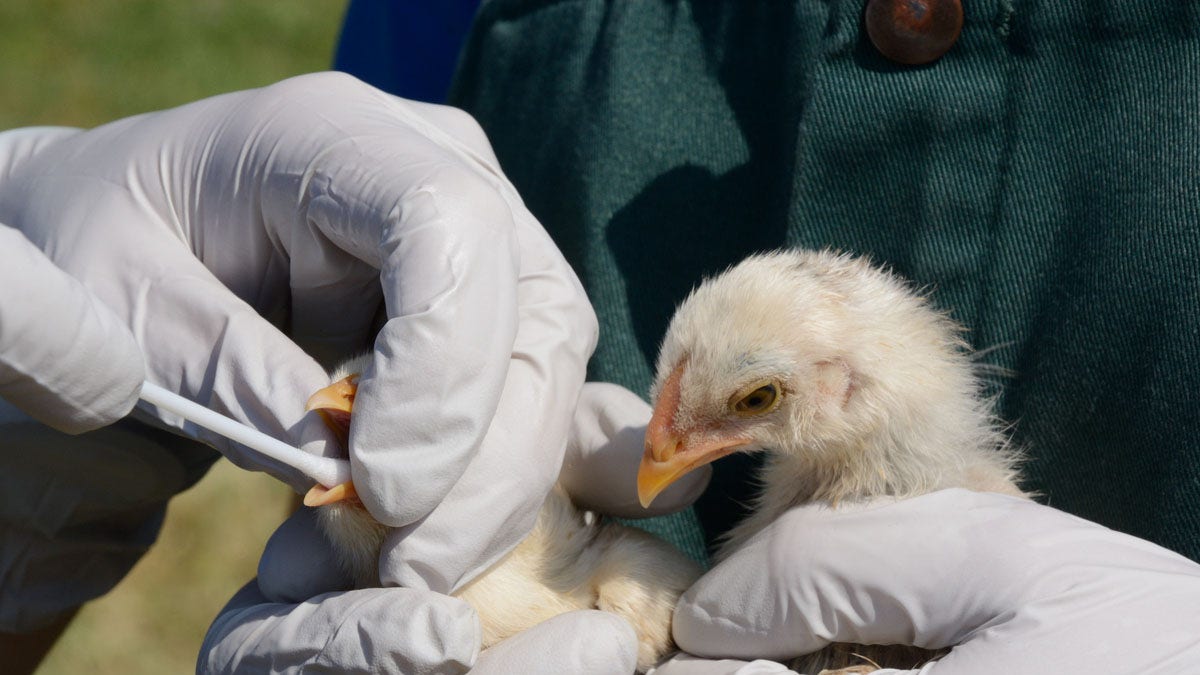We support our Publishers and Content Creators. You can view this story on their website by CLICKING HERE.
Concerns about bird flu — officially known as avian influenza A (H5) — continue to mount, particularly in California.
As of Oct. 14, the state has had six confirmed and five possible human cases of bird flu, according to the California Department of Public Health (CDPH).
All of the affected individuals reportedly had direct contact with infected cattle at nine dairy farms, the department stated.
FIRST CASE OF HUMAN BIRD FLU DIAGNOSED WITHOUT EXPOSURE TO INFECTED ANIMALS, CDC SAYS
The U.S. Centers for Disease Control and Prevention (CDC) is conducting tests to confirm the five possible cases.

As of Oct. 14, California has had six confirmed and five possible human cases of bird flu. (iStock)
All the individuals experienced “mild symptoms,” including eye redness or discharge (conjunctivitis), the CDPH stated. None were hospitalized.
There is not a concern at this point about human-to-human transmission, according to the agency.
“Evidence continues to suggest only animal-to-human spread of the virus.”
“Given the amount of exposure to infected cows, evidence continues to suggest only animal-to-human spread of the virus in California,” said the CDPH statement.
“Additionally, based on CDC’s genomic sequencing of three California bird flu cases, there is no evidence to suggest an increased ability for the virus to infect or spread between people and no known reduced susceptibility to antiviral medications.”
IN A POTENTIAL OUTBREAK, IS BIRD FLU TESTING AVAILABLE FOR HUMANS? WHAT TO KNOW
As of Oct. 15, there were a total of 20 confirmed human cases of bird flu in the U.S., according to the CDC.
Colorado and California have had the most cases, with others reported in Michigan, Missouri and Texas, the same source stated.

Getting the flu vaccine also makes it less likely that someone will end up with a suspected case of avian flu as a result of having the seasonal flu and a history of animal exposure, an expert said. (Jeff Kowalsky/AFP via Getty Images))
Roughly half of those were linked to exposure to infected cattle and the other half to infected poultry.
“To a large extent, the higher numbers we are seeing in California, and previously in Colorado, are due to more aggressive monitoring and case finding efforts in those states, rather than necessarily reflecting a larger burden of disease,” Shira Doron, MD, chief infection control officer at Tufts Medicine Health System in Boston, told Fox News Digital.

“Seasonal flu cases will be rising soon, and we will need to distinguish quickly between regular flu and avian flu, especially in animal workers,” an expert noted. (iStock)
“California has one of the more comprehensive programs to find avian influenza in its cattle herds, and when they find sick cows, they monitor exposed health care workers,” she went on.
“The disease has been mostly very mild, so it will only be detected if looked for.”
Should people be concerned?
It’s not known whether the strain that is causing avian flu in cows will ever mutate into a strain that can be spread from human to human, according to Doron.
“Right now, with no evidence of human-to-human spread, it does not have the potential to become a human pandemic, but that could change,” she told Fox News Digital.
“Obviously, scientists and public health officials should be concerned, and should take action to limit the spread of this disease in farm animals.”
BIRD FLU PANDEMIC IN FUTURE? EU WARNS OF POTENTIAL SPREAD TO HUMANS DUE TO ‘LACK OF IMMUNE DEFENSE’
Farm owners and farm workers should also be concerned, she said.
“They should be taking measures to protect those who work closely with animals, especially cows and chickens,” Doron advised.

“It is not time to vaccinate more broadly yet, given the small number of cases, absence of proven human-to-human transmission and mostly mild infection,” said an expert. (iStock)
Sam Scarpino, PhD, director of AI and life sciences at Northeastern University in Boston, said he finds the rising number of human H5N1 cases “concerning.”
“The more spillovers to humans, the more chances there are for the wrong variant to find itself in a person and spark an epidemic,” he told Fox News Digital.
There’s currently no evidence, however, that the virus has mutated to become more infectious in humans, Scarpino echoed.
“At this point, there’s no excuse for a farm worker to die from an H5N1 infection.”
“Most likely, we are seeing the impact of an increasing number of infected dairy farms leading to an increasing number of human infections,” he said.
“California also has active efforts for both human and dairy cattle surveillance, so ascertainment may be higher than in other states.”
Precautions for prevention
Although experts say the risk for human-to-human transmission remains low, they recommend certain public health precautions.
“People who have close contact with animals, particularly farm animals and wild birds, should be taking precautions,” Doron advised.
CDC, WEBMD GIVE UPDATE ON CURRENT BIRD FLU OUTBREAK
The CDC also recommends that farm workers wear personal protective equipment — such as gloves, goggles and face shields — and that farms follow guidance to prevent the spread of the virus between animals.
“Even if a large outbreak isn’t sparked, the risk to farm workers is clearly higher, and we need to ensure they are protected,” Scarpino told Fox News Digital.
“At this point, there’s no excuse for a farm worker to die from an H5N1 infection.”

All of the affected individuals in California reportedly had direct contact with infected cattle at nine dairy farms, the health department stated. (AP Photo/Vadim Ghirda, File)
It’s also important for people to get their seasonal flu shot, experts say.
“While it is not likely to protect against avian flu, it will help people avoid being infected with the seasonal and avian strain at the same time, which can lead to genetic mixing and emergence of a pandemic strain,” said Doron.
CLICK HERE TO GET THE FOX NEWS APP
Getting the flu vaccine also makes it less likely that someone will end up with a suspected case of avian flu as a result of having the seasonal flu and a history of animal exposure, she added.
Vaccines for bird flu are currently in development.
“It is not time to vaccinate more broadly yet, given the small number of cases, absence of proven human-to-human transmission and mostly mild infection,” said Doron.

Roughly half of the infections were linked to exposure to infected cattle and the other half to infected poultry. (iStock)
It is important for tests to be commercially available for avian flu, however.
“Seasonal flu cases will be rising soon, and we will need to distinguish quickly between regular flu and avian flu, especially in animal workers,” Doron noted.
CLICK HERE TO SIGN UP FOR OUR HEALTH NEWSLETTER
“Right now, to test for avian flu, specimens have to go to special public health labs and the results take days to return. We are going to need answers more quickly if we want people to be able to properly isolate and prevent spread.”

The CDC recommends that farm workers wear personal protective equipment — such as gloves, goggles and face shields — and that farms follow guidance to prevent the spread of the virus between animals. (iStock)
The CDPH recommends that California residents monitor for bird flu symptoms for 10 days after exposure.
Those include eye redness (conjunctivitis), sore throat, cough, runny or stuffy nose, vomiting, diarrhea, muscle or body aches, fatigue, headaches, trouble breathing and fever.
For more Health articles, visit www.foxnews.com/health
“If they start to feel sick, they should immediately isolate, notify their local public health department, and work with public health and health care providers to get timely testing and treatment,” the agency advises on its website.

 Conservative
Conservative  Search
Search Trending
Trending Current News
Current News 





